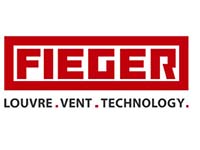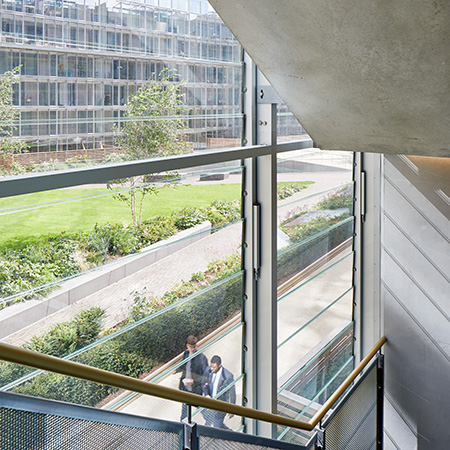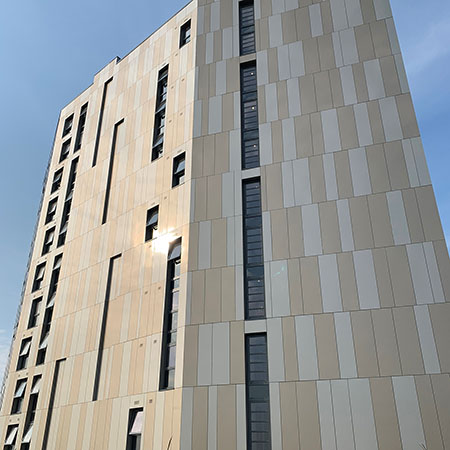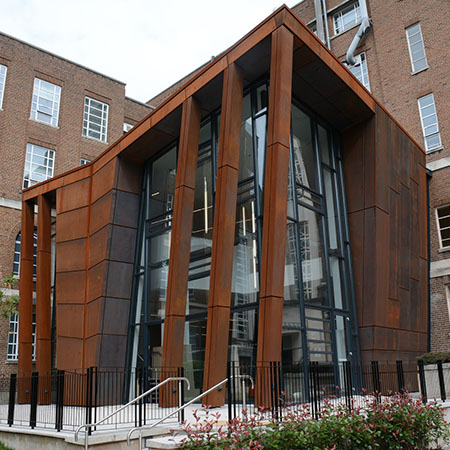This article was first published in the magazine of the Industrie und Handelskammer (Chamber of Commerce) for the Rhine Main Neckar region in Germany.

The new Roland Garros Airport on the French island of La Réunion, in the Indian Ocean, where FIEGER has installed its smart louvre windows.
“MADE IN GERMANY” ALONE IS NO LONGER SUFFICIENT
Dirk Stefan Polte, Managing Director of FIEGER GROUP, explains in an interview whether he still promotes the former seal of approval with his customers - and what this has to do with a policy of “driving with the handbrake on”.
IHK Chamber of Commerce (IHK)
Mr Polte on your company’s homepage you write FIEGER Louvre Windows are what people imagine Germany Engineering to be from the phrase “Made in Germany”. What characteristics were you referring to exactly?
DIRK STEFAN POLTE (DSP)
"Our values of quality and reliability are recognized across the world and are strongly embedded in our company. FIEGER louvre windows stand for iconic design, durability and quality. We’ve been in business for almost 25 years and our first louvre windows are still working perfectly. Standardised endurance tests confirm the extraordinary reliability of our products. Our engineers always strive to achieve a greater degree of precision and often higher than the required test standards. German punctuality builds confidence in our delivery and product promise. All this is achieved by setting clear objectives, hard work and a high level of staff involvement."

Dirk Stefan Polte has been in charge of FIEGER Group since 2019 and with his team is striving for growth within the strategy >>FIEGER – Next Level<<. Polte’s career began over 30 years ago as a reserve Army Officer and led him to train and study in all three world regions: EMEA, The Americas & Asia Pacific. He worked for a number of national and global companies and management consultancies, such as Steigenberger, Worldhotels and the Hertz Partner Top-Alliance, at all levels from an ordinary employee to General Manager.
>>> "OUR VALUES OF QUALITY AND RELIABILITY ARE RECOGNIZED ACROSS THE WORLD AND ARE STRONGLY EMBEDDED IN THEIR COMPANY" <<<
IHK
What is “Made in Germany” worth today?
DSP
Previously at international exhibitions our products would virtually be snatched out of our hands. Today we have to meet the challenges of a new more volatile and uncertain world. Business development and sales necessitate more red tape, European and international certification, knowledge of supply chains as well as trading conditions regarding customs and statistics. International competition doesn’t sleep, products from areas such as Shenzhen are available at a fraction of German prices. That complicates international competition, where the entry-level price is often still what decides matters. We argue for the Total-Cost-of-Ownership as well as promoting the use of CO2 reduced aluminium, production in Germany simply means ever-increasing administrative effort and costs. The “Made in Germany” label alone isn’t sufficient to compensate for these disadvantages.
IHK
Do you still use the German country of origin to promote your products across the world?
DSP
In markets such as the Middle East, North Africa and the Commonwealth the “Made in Germany” label still carries a lot of weight. In France, Spain and Portugal, however, we’re more cautious that it could be counterproductive. Nevertheless, in many countries it remains an asset, although it’s always dependent upon the region and the respective culture.

The architecturally demanding La Réunion Airport.
In 2000 Thomas Fieger invented, patented and certified the Fieger Louvre Window, to meet the prevailing demand in the market. This success laid the foundations for the national and international development of the company. Today the core brands “SmoTec by FIEGER” and “AirTec by FIEGER” provide solutions for architects and designers across the world for smoke extraction and natural ventilation, meeting the latest national standards. All FIEGER products feature a precision-engineered iconic design, providing versatility and an especially high degree of reliability. The tailor-made product portfolio has enabled solutions for even the most demanding building projects across the world.
IHK
What requirements do you have from the politicians to be able to manage business better in Germany?
DSP
What bothers me is that in Germany we seem to be having to drive with the handbrake on. In every part there are many overly complex and ill thought-through laws, which for investors, entrepreneurs and employees are confusing. For example, in data protection while for decades we have instinctively observed data protection in the same way as health & safety at work, the impact of new technology such as Artificial Intelligence, means that data is suddenly no longer protected. What I would like from the politicians are well thought-out regulations and sufficient entrepreneurial freedom not to jeopardise proven trial and error methods. In these uncertain times we have to be able to quickly try out new things. Any overregulation will hold us back. In view of the complex global situation and political tensions, we need more guidance from politicians but less interference in the economy.
IHK
How are worldwide events and changes making themselves felt?
DSP
Let’s take Brexit as an example. Previously I could export directly from my despatch department in Germany to our subsidiary in the UK. Today I have to use an export agency who on each occasion takes 50 to 100 Euros extra as well as an import agency who also takes between £50 to £100 a time. That best illustrates the obstacles we face. Brexit, as well as other rapid global changes, has had a considerable effect on our business.
IHK
What other hurdles do you face?
DSP
When we consider the area of product licences and certification, they play a particularly important role. In spite of our European certification, we had to obtain American certification for a large project in Boston for Harvard University, which incurred even greater expense. In this case, the scandal surrounding exhaust gas emissions involving the German motor industry didn’t help to instil confidence. Compliance with regulations still varies greatly around the world. Perhaps Germany should not always be at the forefront until the same rules apply to everyone.
The birth of “Made in Germany” dates back to the 23rd August 1887. It was on this day that the British Trademark law was enacted. German products, which were generally felt to be inferior, from that date had to display the “Made in Germany” label. The plan to force German products to indicate their source of origin in the market was a complete failure. At the end of the 19th Century German manufacturers had dramatically caught up with regard to the quality of their products. A lot of buyers now recognised that many items they had bought originated in Germany and were in no way inferior; knives and shears as well as clothing, toys, furniture, tools, pencils and many other things.
These days the “Made in Germany” label is something that many German companies value highly. A substitute label “Made in the EU” was rejected in 2004 as a result of protests in Germany. “Made in Germany” is not an actual seal of quality. The manufacturer decides if they inscribe their products with the country of origin.
From an article by Matthias Voigt, translated by Lindsay Eccles.





